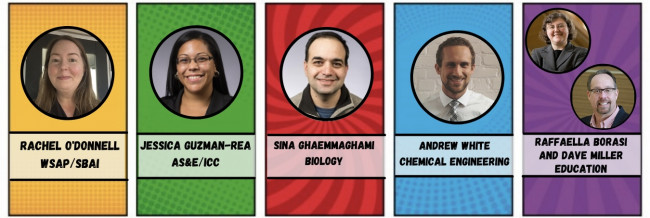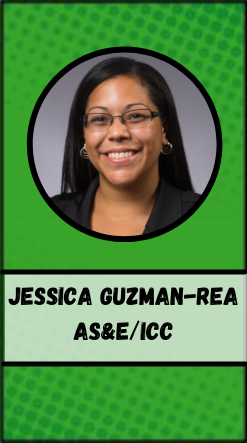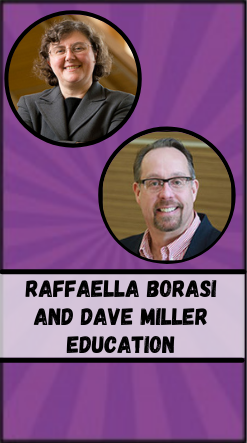
See our third cohort of Zero-Cost Heroes (Est. March 2022)
Since our first round of zero-cost heroes, the OER Working Group of the River Campus Libraries has been hard at work, developing an OER grant program and identifying more low-cost/increased-access champions across campus. As part of Open Access Week 2021, we proudly announce six new zero-cost heroes, three of whom have been awarded an Open Education Resource grant to develop course materials that will lower costs for students and increase their level of learner engagement.
All of our selected heroes are instructors and faculty who, for a number of reasons, have chosen to select or create course materials that are free for their students. Each day we'll be highlighting one hero, sharing their motivations for championing free course materials, how they've worked with the library to make it happen, and what their students have to say about zero-cost materials.
Zero-Cost Heroes is part of an ongoing effort on behalf of River Campus Libraries (RCL) to ensure equity, access, and empowerment for all our students. See what else RCL has accomplished by reading about our ACT commitment or visiting our Open Education Services page, where you can view a number of presentations from our Open Educational Resources and Open Pedagogy workshop series.
Want to nominate someone as a Zero-Cost Hero? Email us at rclconsult@library.rochester.edu.
Monday's Hero: Rachel O'Donnell

It's fun to design a class with cheap materials
Imagine being a sophomore in college. The philosophy course you registered for has a required textbook that costs $90. You won't be able to afford that until you get paid, which isn't for another three weeks, and by that time, you will be way behind in the readings and homework assignments.
This is a familiar situation, one that Rachel O’Donnell, assistant professor in the Writing, Speaking, and Argument Program, experienced personally. Her past hardship led her to a pedagogical path of caring, fostering equity in the classroom, reducing costs for students, and engaging them with a variety of current and edgy materials that could never be found in a textbook. O'Donnell says that the pandemic has “made professors more sensitive to students’ situations.”
O'Donnell was nominated by Warish Orko, a student from her GSWS 206/PHLT 206 course (Global Politics of Gender and Health), immediately after the library launched the Zero Cost Hero program in March 2021.
“I enjoyed the class because I didn’t feel that anyone was on a different footing,” says Orko. “I didn’t have to buy an expensive textbook only for it to have no use after the class ends. It’s additional labor on top of what you’re already doing as a student.”
Given her personal struggle with textbook prices, O‘Donnell is committed to keeping costs down for students. She prefers assigning a few inexpensive paperbacks on targeted topics over a standard set of general concepts outlined in a traditional textbook. She combines low-cost texts with PDFs and e-versions of books, chapters, and articles through the library’s Course Reserves service. Further, O’Donnell praises staff from the Art & Music Library and the Susan B. Anthony Institute for helping to arrange free viewings of essential films that could normally cost each student $20 via streaming media.
“It’s fun to design a class with cheap materials," O’Donnell says. “There are no textbooks available that would start with topics like 'the racist history of medicine' or that address the political implications of feminist science studies."
Her students also bring in all kinds of interesting things, particularly on topics that engage curiosity and fill in gaps of concepts they were never taught. In a course where students discuss the impacts of the lack of information on gender and global health, it is important to O’Donnell that her students have all the information they need, provided to them at little to no cost at the time that the semester begins—not three weeks later.
Tuesday's Hero: Jessica Guzmán-Rea

Equity and inclusion? That's just what I do.
Jessica Guzmán-Rea, assistant dean for diversity and the director of the Paul J. Burgett Intercultural Center, is no stranger to creating an environment of equity and inclusion. “That’s just what I do,” she says, when asked about her background and experience in lowering costs for students and increasing their access to course materials.
Guzmán-Rea remembers the extraordinary cost of her college textbooks and admits to keeping them long after the course was finished and long past their usefulness, just because they cost so much. Selling them back for a fraction of the price or simply giving them away seemed like money wasted.
Today, Guzmán-Rea sees a number of opportunities to increase access to materials: the course reserve system, specifically the ability to purchase multi-user copies of some desired titles; the Kearns Center’s textbook lending library; prioritizing materials in digital format that have become essential during the pandemic. The ACT Commitment caught her attention as the River Campus was making the shift to digital and more affordable materials. She also takes advantage of Rochester's Basic Needs Hub and book vouchers to help students manage their annual costs and pay for expensive course materials.
Her efforts extend beyond the typical undergraduate population that one would expect. In Rochester Scholars, a pre-college summer program, Guzmán-Rea partnered with the Admissions Office to purchase multiple copies of “the perfect book” for the students. Students had access to the books during the program, and those copies have been reserved for the next round of Rochester Scholars. And in a graduate-level course in social work that she teaches online, she arranged for unfettered access to the course-essential reader in digital format.
No matter at what academic level or life circumstance, Guzmán-Rea is a champion for connecting students and their most essential needs.
Wednesday's Hero: Sina Ghaemmaghami

Textbooks are good for reference, but they leave out the most interesting part of science.
There are many courses students take where the assignments become distant memories as soon as they receive their grade. This doesn’t happen in Sina Ghaemmaghami’s undergraduate Biochemistry class. Ghaemmaghami, the Mercer Brugler Distinguished Teacher Professor and director of undergraduate research in the College, has his students create a video that explains the structure of a protein. This approach is an example of open pedagogy, in which students are creators of information, not just consumers of it. Ghaemmaghami also keeps the costs of his class low because he doesn’t require the purchase of a textbook. Students can refer to any textbook to find information, but as he notes, “textbooks are good for reference, but they leave out the most interesting part of science: discovering how the information was discovered.” The video assignment allows students to investigate the original research from the freely-accessible Protein Databank.
The first time Ghaemmaghami tried this assignment, he wasn’t sure how his students would react. He worried for nothing; his students loved it. He explains the assignment is often personal for students, saying “some choose their protein because it’s about a disease that’s in their family or because of its technical applications.”
The videos created by the students have garnered a lot of views as well. And Ghaemmaghami says students remember the protein they chose for the assignment years after completing the class.
And, in case you were wondering if Ghaemmaghami has a favorite protein, he does. It’s the prion protein, which is involved in a number of different neurodegenerative disorders, including Creutzfeldt-Jakob disease.
Thursday's Hero: Andrew White

While there are already many resources about deep learning, most of them exist behind a paywall.
Andrew White, associate professor of chemical engineering, is the first recipient of the River Campus Libraries Open Education Resource (OER) Grant. The grant will enable him to continue working on his open textbook, Deep Learning in Chemistry and Materials Science, which he’s already spent nine months building.
White’s textbook examines “deep learning,” a specialized form of artificial intelligence and its applications within the field of chemistry. He explains that, while there are already many resources about deep learning, most of them exist behind a paywall, and there are none that focus specifically on chemistry and materials science. The project is also unique in that it is a living textbook. That means the text can be consistently updated to keep up with the rapid growth of deep learning technology.
White’s OER grant also enables him to add new textbook chapters on symbolic regression, semi-supervised learning, and few-shot learning, as well as new graphics and exercises for the existing chapters. Additionally, he will be able to ensure that the textbook is accessible to all learners. But he won’t be doing it alone, as he intends to involve several of his PhD students. So, not only is he creating an OER, he’s engaging his students in open pedagogy, which makes them creators as well as consumers of information.
Take a look at the textbook in its current iteration and keep up with White by following him on Twitter: @andrewwhite01.
Friday's Heroes: Raffaella Borasi and Dave Miller

Giving students the opportunity to publish an edited version of their interview project report as part of this living text.
When Warner School of Education’s Frederica Warner Professor Raffaella Borasi, director of the Center for Learning in the Digital Age, and Dave Miller, director of the Digitally-Rich Teaching and Instructional Technology program, sought a textbook with a case-study approach to innovative education, they couldn’t find one. So, they created their own.
Borasi and Miller created a set of case studies for students taking EDU 446: Entrepreneurial Skills for Educators. Students could use the materials as a reference and as inspiration on how to conduct, analyze, and report on their own interview of a local entrepreneurial educator of their choice (a major course project).
The River Campus Libraries Open Education Resource (OER) Grant is helping them transform this text into a resource that is part open-access textbook, part OER. The text will serve as a teaching source that other educators will be able to adapt to fit their needs. They Warner faculty members said they are especially looking forward to their ability to “develop the collection of inspiring stories of entrepreneurial educators by giving students the opportunity to publish an edited version of their interview project report as part of this living text.”
With their open pedagogy approach, Borasi and Miller are helping students become authors and share their expertise with a wider audience.


